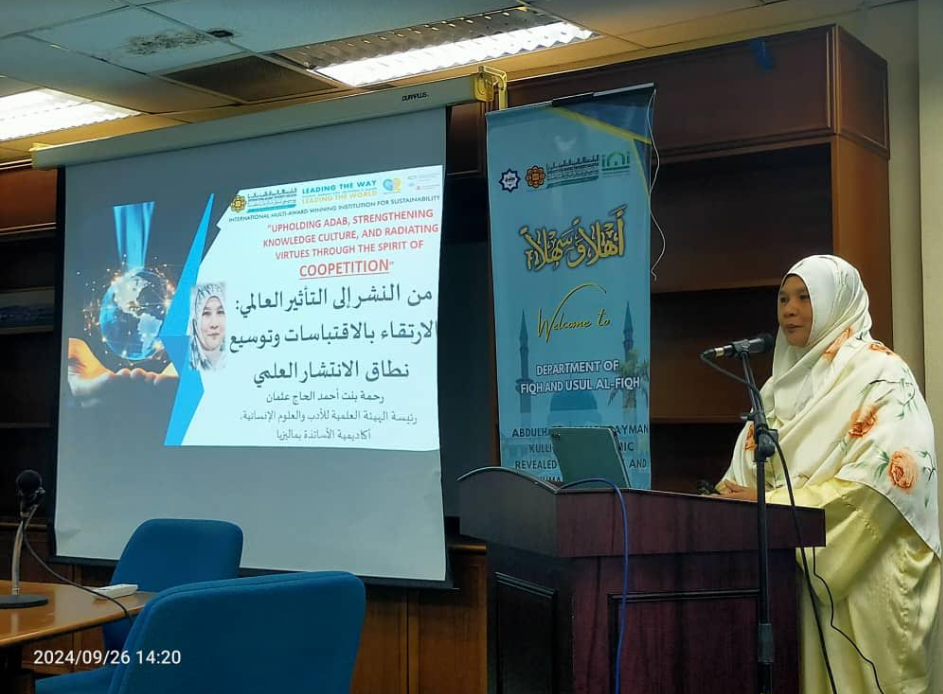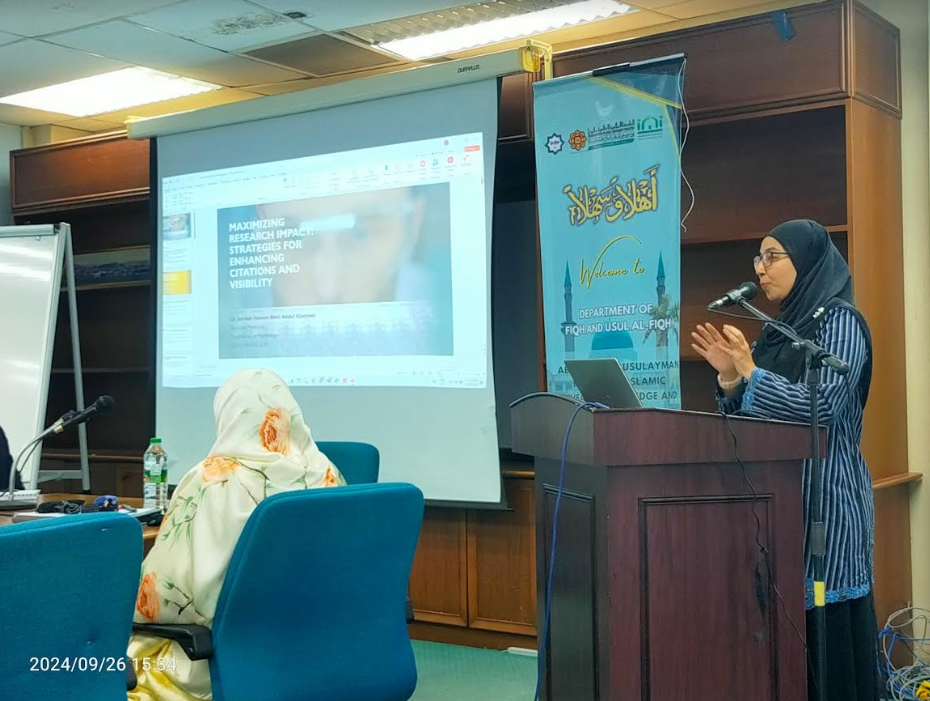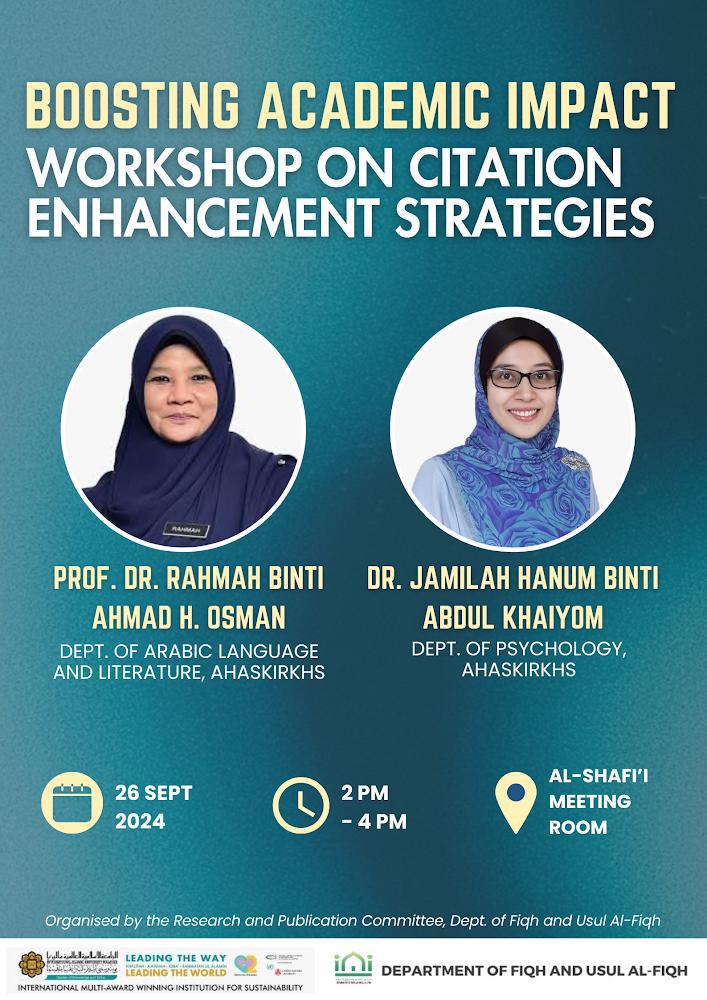By, Sayyed Mohamed Muhsin & Mohd. Fuad B. Md. Sawari
In academia, citations serve as a crucial measure of scholarly impact, reflecting the significance and influence of research contributions within the academic community. Scholars and researchers strive not only to produce high-quality work but also to ensure its recognition and dissemination. Acknowledging the importance of citations and visibility for academic publications, the Department of Fiqh and Usul al-Fiqh, AHAS KIRKHS at IIUM, organised a workshop titled, “Boosting Academic Impact: Workshop on Citation Enhancement Strategies” on Thursday, 26 September 2024, through its Research and Publication Committee. The seminar was part of the department’s initiatives for the “Scholarship Advancement Programme” 2024.
The Objectives of the Workshop
The key objectives of the workshop were as follows:
- to provide participants with comprehensive strategies for increasing citations for academic publications, focusing on both the department’s journal and individual research articles;
- to educate attendees on pre-publication measures aimed at enhancing the visibility and appeal of research outputs, thereby increasing their likelihood of citation;
- to explore post-publication measures and effective dissemination techniques for maximising the impact and citation potential of research publications; and,
- to empower participants with practical tools and approaches that can be implemented to enhance the citation impact of their scholarly work, ultimately contributing to the advancement of academic discourse within the field of Fiqh and Usul Al-Fiqh.
The programme consisted of two sessions, one in Arabic and another in English, featuring two experts who shared their extensive knowledge and experience in the field:
- Prof. Dr. Rahmah Binti Ahmad H. Osman (Department of Arabic Language and Literature, AHAS KIRKHS)
- Dr. Jamilah Hanum Binti Abdul Khaiyom (Department of Psychology, AHAS KIRKHS).

Major Insights Shared by Prof. Dr. Rahmah Binti Ahmad H. Osman
Prof. Dr. Rahmah emphasised that publishing in indexed journals is crucial for building an academic reputation, enhancing credibility, and increasing visibility within one’s field. It plays a key role in career advancement, serving as a critical factor for promotions and tenure. Publishing allows scholars to contribute to the global academic community and helps establish networks with peers and experts. Citations are fundamental to academic success, as they amplify scholarly influence, support career progression, enhance institutional reputation, and increase access to funding opportunities.
To boost citations, scholars should focus on the following key steps:
- Publishing in High-Impact Journals: Choosing to publish in high-impact journals increases the visibility and reach of your work, making it more likely to be cited and recognised by the academic community.
- Collaborating with International Scholars: Working with international scholars can expand your research’s scope, increase exposure, and enhance the potential for interdisciplinary breakthroughs.
- Optimising Paper Visibility: Ensure that your paper’s title, keywords, and abstract are clear, concise, and searchable to improve discoverability in academic databases.
- Ethical Self-Promotion: Engage in ethical self-promotion by utilising social media platforms like LinkedIn, Twitter, and ResearchGate. Use academic platforms such as Google Scholar and Academia.edu, and consider publishing preprints to gain early visibility for your research.
- Citing Strategically: Be mindful of citing relevant and impactful works, which not only improves the quality of your paper but also increases the likelihood of reciprocal citations.
- Presenting at Conferences: Presenting your research at conferences helps disseminate your work to a broader audience and develops professional relationships within your field.
- Consistency in Publishing: Maintaining a regular publishing schedule is crucial for sustained academic growth and visibility, helping to build a strong academic profile over time.
- Timeliness and Global Relevance: Enhance the relevance of your research by addressing timely issues that have global or policy significance. Engaging with the Global South and focusing on research topics of widespread concern increases the impact of your work.
- Tracking and Measuring Impact: Keep track of your research’s impact through metrics such as citations, downloads, and social media engagement to understand how your work is influencing the academic community and beyond.
- Embrace Coopetition: Collaborating with competitors fosters shared value creation, leading to collective growth and innovation through diversity. This strategic collaboration can significantly increase citations by expanding research reach and enhancing visibility across academic networks.
- How to Embrace Coopetition: To effectively embrace coopetition, scholars should collaborate with competitors, engage in cross-institutional projects, and leverage open-access platforms. This approach represents a new frontier for strategic collaboration, fostering an environment of mutual growth and academic advancement.

Key Points from Dr. Jamilah Hanum Binti Abdul Khaiyom’s Presentation
Dr. Jamilah emphasised that citations are vital for both academic recognition and career advancement, serving as indicators of a researcher’s influence across various fields. They provide a means to measure research impact for individuals and institutions alike, with key metrics such as the h-index, citation counts, and journal impact factor significantly influencing career decisions, funding opportunities, and promotions. Higher citation counts indicate research success, reflecting broader academic engagement. Furthermore, citations contribute to a feedback loop: more citations lead to greater visibility, and highly cited research garners increased attention from both academic and public audiences.
To boost citations, she recommended the following key strategies:
- Clear, Concise Titles: Short, engaging titles with active verbs (e.g., “enhances,” “reduces,” “improves”) tend to attract more citations.
- Open Access (OA) Advantage: OA articles are cited more frequently than closed-access ones. Freely accessible research, whether Gold, Green, or Bronze OA, reaches a wider audience. Publishing in journals with broader readership, indexed in major databases like Scopus or Web of Science, increases visibility and citation potential.
- Self-Archiving: Platforms like ArXiv and ResearchGate boost visibility and citations by making research freely accessible. Preprints also help with early exposure and earlier citations.
- Collaboration Benefits: Articles with multiple authors or corporate partnerships receive more citations. Collaborations, especially multi-institutional ones, expand the research’s network and reach.
- Social Media Promotion: Sharing research on Twitter, LinkedIn, or other social media platforms enhances visibility, leading to more citations from a broader audience.
- Keyword Optimisation: Including relevant, searchable keywords in titles makes research easier to find on search engines like Google Scholar, leading to higher citation rates.
- Strong Abstracts: A well-written, concise abstract that clearly summarises the research problem, methods, findings, and significance attracts readers and leads to more citations.
- Updated Academic Profiles: Keeping profiles on ResearchGate, Google Scholar, and ORCID up to date increases research visibility and discoverability, which can lead to more citations.
- Timely Topics: Publishing on trending or current scientific themes enhances the chances of citations. Research aligned with emerging issues, such as public health, often gains immediate attention.
- Supplementary Materials: Providing additional materials like datasets, videos, or infographics makes research more engaging and shareable, boosting its citation potential.
- Media Coverage: Collaborating with media outlets for broader coverage of research expands visibility beyond academia, often resulting in a spike in citations.
- Indexing in Major Databases: Ensuring your work is indexed in databases like Scopus and Web of Science increases its discoverability, contributing to more citations. Additionally, responding promptly to reviewer feedback can improve the quality and impact of the research.
To sum up, the workshop provided significant benefits to the participants, and we anticipate that this report will prove valuable to many others as well.***
(Dr. Sayyed Mohamed Muhsin and Assoc. Prof. Dr. Mohd. Fuad B. Md. Sawari are academic members at the Department of Fiqh and Usul al-Fiqh, AHAS KIRKHS, IIUM.)
- Islamic University VC Engages with IIUM Community on Integrating Shariah Law into Bangladesh’s Legal System - January 28, 2026
- SISCO Launches Certified Course on Visionary Leadership and Community Engagement at IIUM - January 28, 2026
- Memorandum of Understanding (MoU) Signing Ceremony between IIUM and Aafiyat Holdings Sdn. Bhd - January 28, 2026
